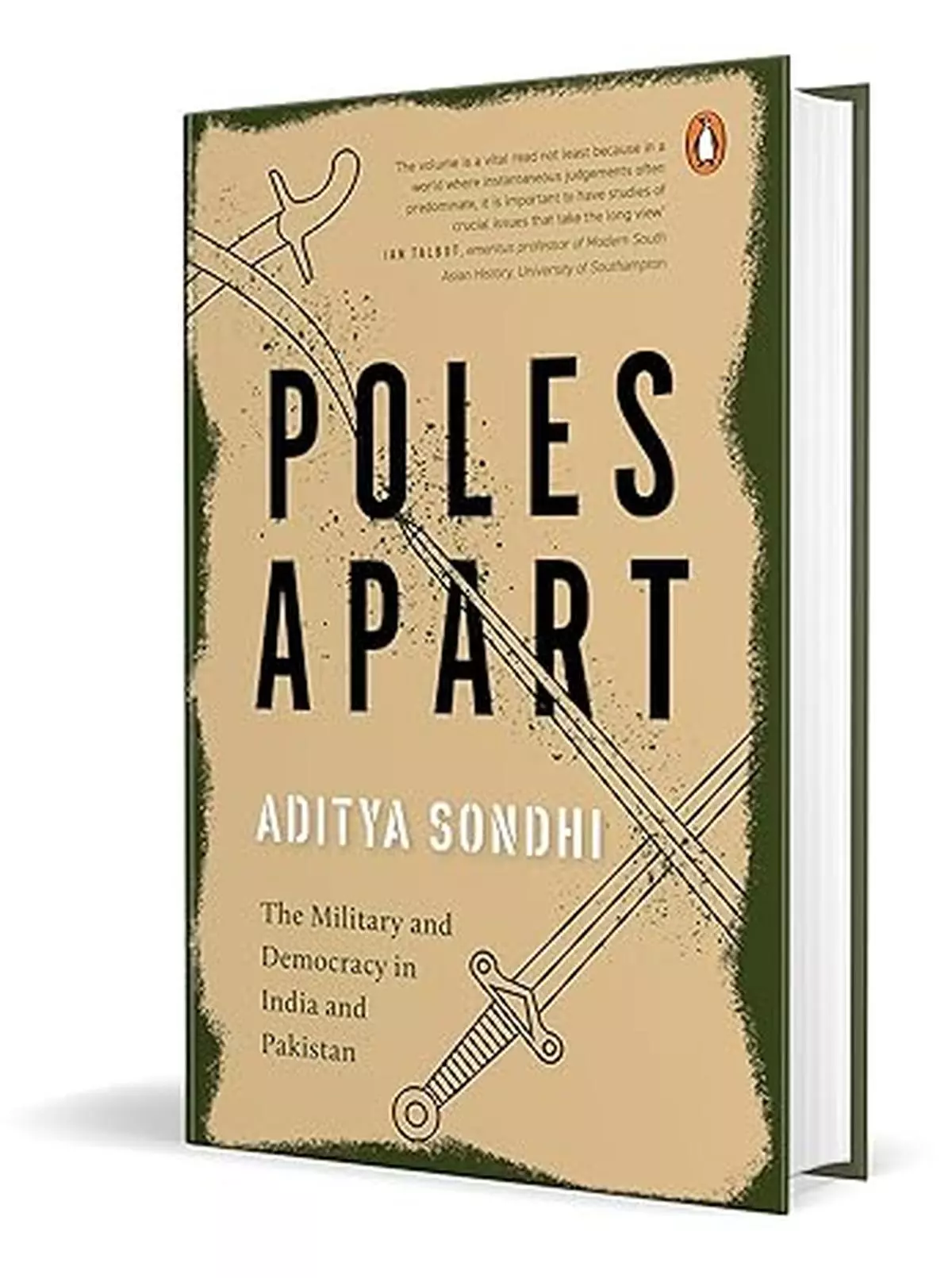
Soldiers from Pakistan and India perform the Lowering of the Flag Ceremony at the Attari-Wagah border on December 4, 2022.
| Photo Credit: R.V. MOORTHY
When, in the first week of August, former Prime Minister Sheikh Hasina of Bangladesh resigned and fled the country in the wake of massive student protests that the authorities could not control—protests that led to over 400 deaths—Indian social media was filled with self-congratulatory posts that claimed our country had escaped a similar fate solely due to the strength of our Constitution and democracy thanks to the likes of B.R. Ambedkar and our first Prime Minister, Jawaharlal Nehru.
Poles Apart: The Military and Democracy in India and Pakistan
By Aditya Sondhi
Viking India
Pages: 336
Price: Rs. 699
This is correct to an extent (though I would caution India about our own autocrats drawing the worst lessons from this episode and from the one in Sri Lanka two years ago). But an important reason why India has remained a stable democracy is elucidated in Aditya Sondhi’s book Poles Apart: The Military and Democracy in India and Pakistan, which provides a survey of civil-military relations in both countries as well as in Bangladesh. Sondhi says: “…one can conclude that the military in India respected constitutional space enough to let these (political) situations work themselves out in a befitting manner.”
Also Read | Bangladesh’s student protests: A test for Sheikh Hasina’s leadership
This may seem obvious. Sondhi, though, gives examples of a few moments when India nearly slipped up. It was not easy. Certainly Nehru and his Defence Minister V.K. Krishna Menon did not make it easy; Nehru was conscious of keeping the military at arm’s length and put in a defence bureaucracy between the armed forces and the political leadership (a buffer that the government has lately tried to do away with, by creating the post of Chief of Defence Staff).
Menon, like Nehru, was seen as so left-leaning that they were both blind to China’s hostility, which was proven true by the Chinese invasion of the north-eastern region in 1962. Perhaps it would have been prevented if senior Army appointments had been done without political favouritism, the most disastrous being the appointment of B.M. Kaul as the Chief of the Army Staff. It is a legacy that we hope never to repeat.

Poles Apart: The Military And Democracy In India And Pakistan by Aditya Sondhi
| Photo Credit:
By Special Arrangement
Otherwise, the Indian Army has kept to itself, following the British tradition of distancing itself from politics; also, an accomplished political and bureaucratic class has allowed the Army to keep its distance and stick to its job, a job it has performed creditably so far. It even stayed away during the Emergency.
Two major omissions
If something is missing from Sondhi’s book, it is the so-called coup that never was, of January 16, 2012, when General V.K. Singh was the Army chief. An armoured movement was spotted south of Delhi but later explained as a shifting of the Ordnance Depot. Later, General Singh, who became a minister in the BJP government, denied that any coup took place. Even so, this was an episode worth investigating and clarifying—a major omission in an otherwise broad panorama.
Another lacuna concerns the story of the Pakistan Army. On May 9, 2023, after Prime Minister Imran Khan was arrested, his supporters stormed the house of the Lahore Corps Commander, whose family slipped out through the back door. The Pakistan Army was so embarrassed that it court-martialled the commander.
“The Indian Army has kept to itself, following the British tradition of distancing itself from politics; it even stayed away during the Emergency.”
This worrisome episode does not make it into Sondhi’s book, inexplicably, for there is no better illustration of why an army should not meddle in politics. Especially because after Khan’s party was banned from this year’s election, his candidates still won most seats (albeit as Independents). Again, the history of Pakistani civil-military relations is provided by Sondhi, but frankly, for readers who have had an interest in Pakistan, there is nothing new. Pakistan had a weak political establishment beyond founder Muhammad Ali Jinnah, its civilian bureaucracy was no bulwark against the military, and the floundering nation found itself under the benevolent jackboot of Ayub Khan. Yahya-Bangladesh-Bhutto-Zia-democracy-Musharraf: we have heard this song before.
“The balance of power between the military and the civilian establishment in India and Pakistan is poles apart,” Sondhi concludes, and hence the title of his book.
Lastly, there is a section on Bangladesh, which will attract attention given the recent events playing out there. The real mystery is why a leader as popular as Sheikh Mujibur Rahman—who won the 1970 election in undivided Pakistan, a verdict that Zulfiqar Ali Bhutto and the Punjabis were too proud to accept—became autocratic after independence, to the extent that he and his entire family (except his daughters, Hasina and Rehana, who were abroad at the time) were murdered by the army in a bloody coup.
Also Read | In East Pakistan in 1971: A ‘forgotten’ genocide
The Army chief leading the coup was General Ziaur Rahman, whose wife now leads the Bangladesh Nationalist Party, the erstwhile opposition to the Awami League led by Sheikh Mujibur Rahman’s daughter Hasina. In between General Ziaur’s innings and the democracy of the 2000s came a stint by General Hussain Muhammad Ershad.
Two points emerge in Sondhi’s analysis: no matter how much the Bangladeshis might have hated the Pakistanis in 1971, their army derived its traditions and its interventionist outlook from the Pakistan Army to which they belonged before independence. We may see it again soon.
The second is that no matter how much some Indian commentators may rant about China and Pakistan’s Inter-Services Intelligence destabilising Bangladesh, it is the political/military leadership’s tendency towards autocracy that does them in, each and every time.
Aditya Sinha is a journalist and author.





